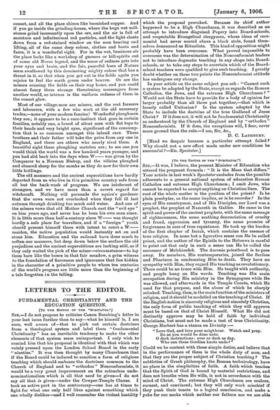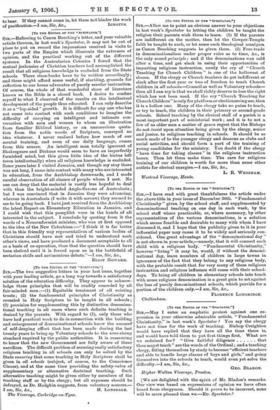(To THE EDITOR OF THU .EPECTA.TORPI was, I believe, the
present Minister of Education who uttered the pregnant formula : "It is the Mass that differs." Your article in last week's Spectator excludes from the possible adherents to a general national system of education Roman Catholics and extreme High Churchmen; I omit Jews, who cannot be expected to accept anything on Christian lines. The root of the whole matter is the position of the priest ? Is he plain presbyter, as the name implies, or is he sacerdos ? In the eyes of His countrymen, and of His Disciples, our Lord was a prophet, the prophet of Nazareth in Galilee. He came in the spirit and power of the ancient prophets, with the same message of righteousness, the same scathing denunciation of cruelty and fraud, oppression and tyranny, the same promise of forgiveness in case of true repentance. He took up the burden of the first chapter of Isaiah, which contains the essence of true religion. In none but a figurative sense can He be called priest, and the author of the Epistle to the Hebrews is careful to point out that only in such a sense can He be called the successor of Melchizedek. The Aaronic priesthood is to pass away. Its members, His contemporaries, joined the Scribes
and Pharisees in condemning Him to death. They have no sympathy with Him, they regard His teaching as revolutionary.
There could be no truce with Him. He taught with authority, and people hung on His words. Teaching was His main occupation during His ministry in the Synagogues while He was allowed, and afterwards in the Temple Courts, which He used for that purpose, and the abuse of which he sharply rebuked. Teaching, then, is the main function of the ministers of religion, and it should be modelled on the teaching of Christ. If the English nation is sincerely religious and sincerely Christian, the only form of public teaching of which they will approve must be based on that of Christ Himself. What He did not distinctly approve may be held of faith by individual Christians, but must not be made a test of true Christianity. George Herbert has a stanza on Divinity :— "Love God, and love your neighbour. Watch and pray. Do as you would be done unto.
0 dark instructions: ever as dark as day. Who can these Gordian knots undo?"
Could we be content with these simple duties, and believe that in the performance of them is the whole duty of man, and that they are the proper subject of Christian teaching ? The subtleties of Greek philosophy, the Roman technicology, have no place in the simplicities of faith. A faith which teaches that the Spirit of God is bound by material restrictions, and does not breathe when He wills, is not in accordance with the mind of Christ. The extreme High Churchmen are zealous, earnest, and convinced; but they will only work mischief if they push their tenets to a logical conclusion, and make a yoke for our necks which neither our fathers nor we are. able
to bear. If they cannot come in, let them not hinder the work



















































 Previous page
Previous page